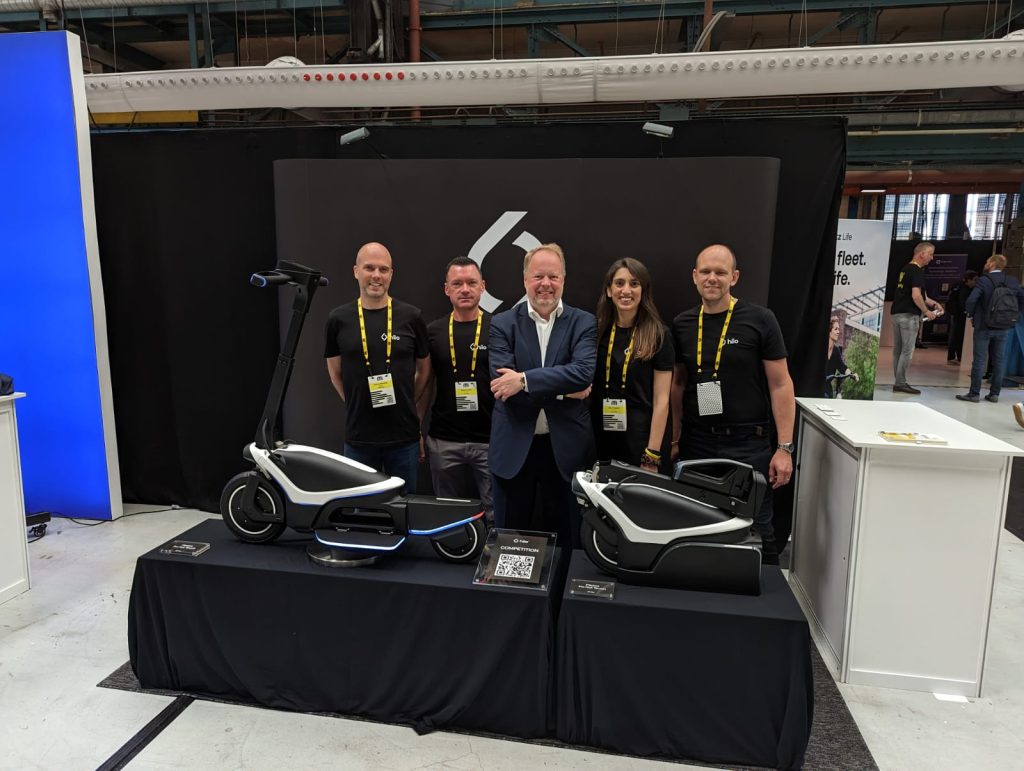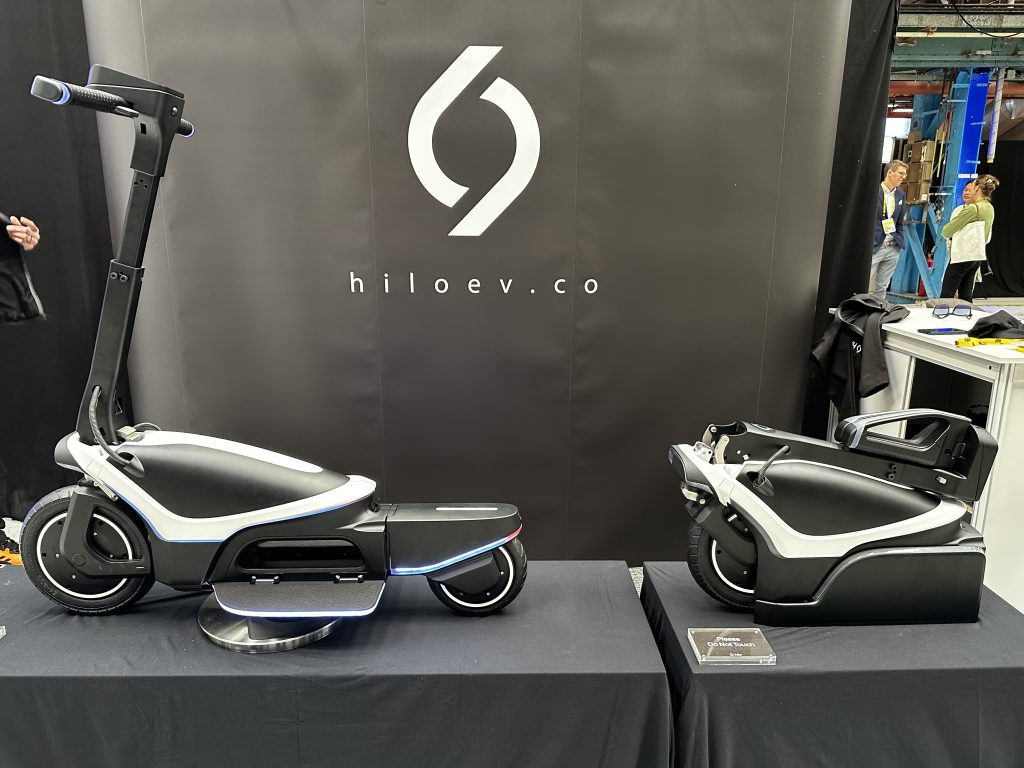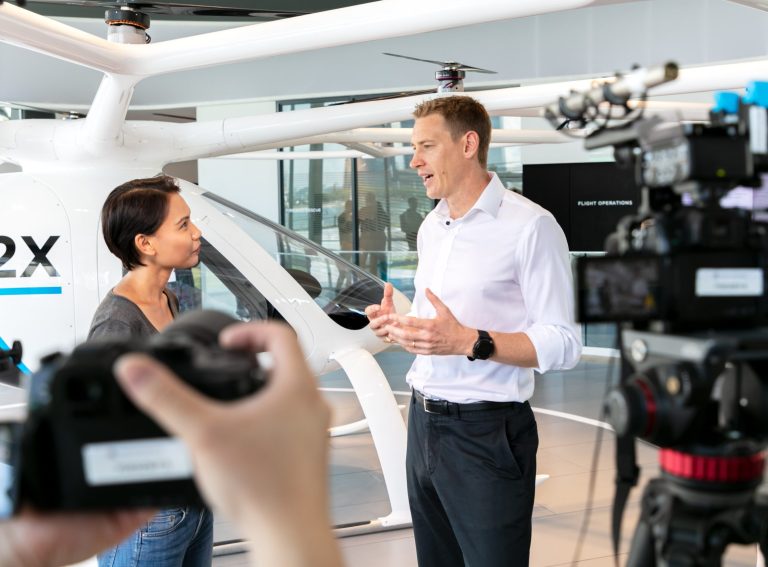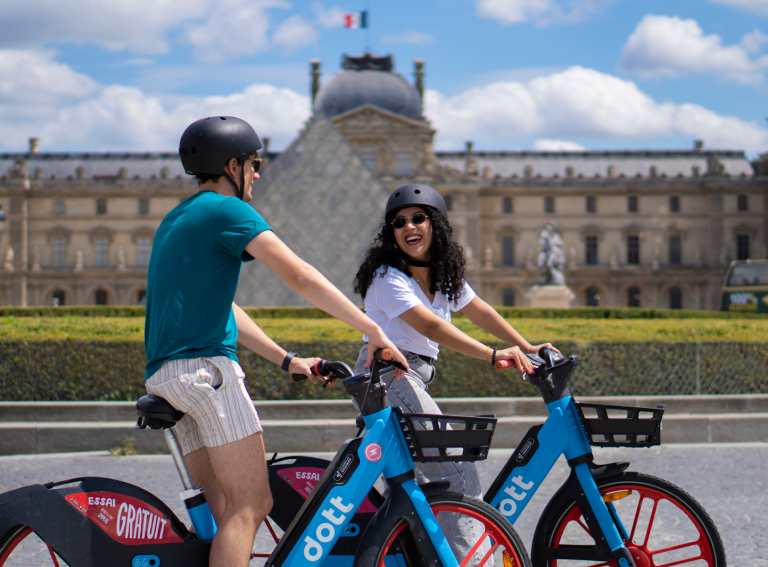Former Aston Martin boss Andy Palmer has swapped iconic sports cars for e-scooters with his latest venture, the Hilo One.
Partly developed by Lotus Engineering and featuring AI technology to alert the rider and pedestrians to potential dangers using visible and audible warnings, plus haptic feedback through the handlebars, the Hilo One is set to stand out when it goes into production in 2024 for putting safety first in a bid to dampen critics of e-scooters.
In addition, an integrated helmet works with the firm’s app to ensure that head protection is worn, and a lighting system is used to project a pool of light around the e-scooter to keep other road users and pedestrians at a safe distance.
Other features include a 12.5-inch front wheel to aid stability and control over bumps and potholes, and an innovative folding set-up that encloses the wheels so it can be easily transported without getting the carrier dirty.
It also has a top speed of 15.5mph, the legal limit, and a range of 25 miles. The battery is supplied by InoBat, another firm where Palmer has an interest as a non-executive chairman, and it can be docked and charged in the boot of a car or on a docking station – all without the use of wires, which can be set-up at home or work. Prices start at £1,750 putting it at the premium end of the marker.
Below, Palmer explains why he got involved in the project, and why the UK risks being left behind in the race to embrace e-mobility in all its forms as a result of its recalcitrance to legislate more proactively.
Zag Daily: What attracted you to work with the Hilo team?
AP: “When I came out of Aston, I was searching for what to do next. I didn’t want to get stuck into one job, but rather a combination of things.
“During that time I received a number of business proposals, some of them personal investment opportunities. I got one from a company that ultimately became Hilo. It caught my attention because the proposition wasn’t just bigging up the opportunity; it was also looking at the downsides. I found the fact that they were very realistic but, in business terms, immature, intriguing, so I arranged to go and meet them over in Cambridge.
“We had a very long discussion where I found them very receptive to ideas. I liked the guys themselves, I liked the connections they had to an innovation lab and a rapid manufacturing facility and, most of all, I liked their openness to ideas and the stuff that evolved out of our catchball session, where we threw ideas at each other.
“Literally, we rode a bunch of scooters around the yard and pinged ideas off each other – if you did this, what if you did that? That’s where the idea of the larger front wheel was born, the idea of the halo protection system, the idea of integrating a helmet into it that has to be worn for the e-scooter to be operated, and more.
“All that came out in an afternoon. I like working with people that are receptive to new ideas and I think they felt the same, so we updated the business plan around that. In order to get them to the first major investment, I put in the seed funding and we’ve been going now for nearly three years, reaching the point I would call the engineering sign-off phase. Next comes the manufacturing phase.”

Zag Daily: Booming interest in e-scooters is evident around the world, but that also leaves you operating in a very competitive marketplace?
AP: “Yes. Just as with automotive, the challenge comes from the East, and particularly China. You have to deeply admire what they are doing and what they are capable of creating and manufacturing. To that end, we have to learn lessons from their processes where we can.
“But what we have as a country is buckloads of imagination and ingenuity, and that can be what sets Hilo apart. We aim to make a more premium scooter – and specifically, one that is intrinsically safe, and that is therefore tackling the main criticisms of scooters being unsafe head-on.
“If you’ll excuse the shorthand, we want to be the Volvo of scooters. I don’t mean that glibly. The point is to take a position that uses thoughtful mechanical engineering and clever electronic engineering to make e-scooters intrinsically safe. We’ve designed our product with great care; rather than going head-to-head with the Chinese, we’ve designed something that is different; the zag to their zig, driven by tackling the safety perspective, but with quality and attractiveness delivered as standard.”

Zag Daily: Why do you see the UK as such a hotbed of innovation?
AP: “We still have some really good work being done in the universities, a lot of it breaking new ground. Some of the brain power on show sits up there in the bracket of being world class.
“But trying to get funding for nascent technology in the United Kingdom is really quite hard. Normally you need families or angel investors at the beginning, but very often you end up going to Europe, the Middle East or Silicon Valley.
“The UK still needs to find a mechanism to stimulate what are high risk but high reward ideas. That puts you into a philosophical debate about what is the right level of involvement of the government. It’s a good debate to have, but the reality is, somehow, other governments have found ways to be helpful to that process, not hinder it.”
Zag Daily: Wasn’t Brexit meant to make it easier for the UK to back UK ideas?
AP: “Well, I mean, I’d like to think that was a reason that we thought that Brexit was a good idea. I can’t comment on anything other than the automotive space, but what I can say is that, where one would have assumed that we would be more competitive in grant applications to bring industry to the United Kingdom, my experience so far is that we’re significantly uncompetitive.”
Zag Daily: But you’ll still manufacture in the UK?
AP: “Hopefully. I won’t deny that in order to get to the kind of price point that we’re aiming at – £1,750 a unit – we’ll probably have to bring parts in from China, Taiwan and Japan, but the assembly and the quality sign offs will all be done in the UK, all being well. Our price point isn’t cheap in the context of e-scooters, but our first barrier is to get to a point where they can at least be purchased.”
Zag Daily: You launched with a special edition model. How are sales going?
AP: “We presented the Hilo One at a conference in Amsterdam recently, and, yes, we created a ‘founders series’ model and offered a run of 500, which has now pretty much sold out. That’s encouraging, but of course it’s also just the start.”
Zag Daily: Is integrating the personal car into transport systems part of your vision?
AP: “In my view, yes. My vision is that many people will start a journey in their car, with an e-scooter, or e-scooters, plugged in, charging in the boot. They’ll set their navigation system door-to-door, but only part of that route they’ll undertake in that car.
“The car might take you to the station, where you’ll get your e-scooter out and carry it with you. You might go from the train to a bus, but once you’re within half a mile of your destination you’ll jump on the e-scooter.
“The key is that it is integrated point-to-point. That brings challenges because then you need a protocol that allows for an interchange of information. That’s probably easier in the public arena – between train and bus providers, for instance – but it’s harder to imagine for car companies. They’d have to feel it gave them an advantage over rivals, and to do that the e-scooter needs to be integrated into the transport system.”
Zag Daily: OEMs appear more interested in collecting data than sharing it. How will that work in an integrated transport system?
AP: “Normally the car OEMs are pretty hopeless when it comes to doing stuff outside of their domain, but I suspect a few will try to collect the data themselves – and probably a fair few will fail, too.
“Maybe some will succeed, but I suspect mostly it’ll be done through collaboration. The trouble is that today it’s a question of imagination. In car companies there’s always a tendency to stray beyond what they do well into what others do well; they’ll learn these lessons, sometimes the hard way, but I think we’ll end up with an industry of its own but with relationships with other car companies.”
Zag Daily: You’ve talked up some aspects of the UK, and talked down others, but how do you view the legislative situation here?
AP: “I’m a-political, and always have been, but just as in automotive, unfortunately the UK is behind on almost everything. We have a concept of ‘small government’ which is applying a laissez-faire approach to letting market forces decide where we’re going, but unfortunately that is at odds with what the rest of the world is doing.
“If I look at the transport space, and the disruption in that space, I don’t think it’s cool to sit back and see where market forces take it. It’s a classic economic theory that just doesn’t apply – what I can see is that every country that cares about their country’s involvement in transport, and which cares about the jobs in transport-related roles, are all positively encroaching upon the space to positively influence it.
“Just look at the Chinese, United States, Japanese, Indians, the European Union – you can’t sit in little old England and say you believe in letting market economics decide the path when the market is so distorted by the activities of others.
“Today’s e-scooter legislation isn’t enough. It only allows you to rent an e-scooter, with a minimum of safety standards and which regularly gets abandoned in the street as nobody has a sense of ownership. That’s only going to ever give the industry a bad name and, sure enough, there’s an avalanche of negativity, of people calling for these things to be banned.
“If you want to get people out of cars, if you want to reduce CO2 from cars, then you have to buy into the idea of an integrated transport system and encourage the use of e-scooters, e-bikes and public transport. You have to meld those innovations. The current administration talks about being a leader in CO2 reduction, but the actions don’t follow the words in any way, shape or form.
“In fact, I’d go so far as to say that the words they have applied to date are potentially more damaging. Using automotive as an example, if I take the UK’s 2030 legislation to stop selling purely combustion engined cars five years ahead of anyone else, all that is doing is exporting jobs. It’s doing nothing else. It’s not helping our industry in any way. It’s not helping our economy and, in reality, as a country we are such a small contributor to CO2, it’s not really helping the climate either.
“At the moment there’s almost no payback for enormous damage. We’ve got to get on top of that. That means an industrial strategy for mobility and for batteries, it means legislating the use of personal use scooters. And it means encouraging other forms of e-mobility that come along. Legislating the use of safe e-scooters is one critical step in that transport revolution.”
Zag Daily: You’ve spoken with – and advised – the Government. Why isn’t it happening?
AP: “I’ve spent so much time listening to discussions and I know that there is an understanding, for example, that if we don’t have six gigafactories by 2030, then we’re going to lose jobs. I know that it’s in the consciousness of ministers, but we don’t seem to be able to get beyond dogma.
“If you’re genuinely serious, about the decarbonisation of travel, then e-scooters, e-bikes, e-cargo bikes – even stuff that’s not even been invented yet – have to form part of the way we move. Right now, you can’t take an e-scooter on London trains and buses because they say there’s a risk of fire.
“There has to be an integrated transport strategy if we don’t want, as a nation, to just be average in terms of policy and CO2 reduction when measured against other nations. We have to get there for the sake of our kids and our grandkids.”
Zag Daily: How late is too late – our e-scooter legislation looks unlikely to pass until after a General Election now?
AP: “It’s almost at the point that it’s too late. If you arrive too late, then you’re just adopting other people’s solutions. The goal is always to be just late enough to be learning from other’s mistakes, but not so late that you bring nothing to it. We’re leaving it mighty late.
“Add in that we’re gonna get disrupted by the throes of a general election for the next 12 months, and the fact that the polls suggest that will lead to a new Government coming in, and that means we may not see any kind of policy stability until probably early 2025. And if you think about the context of decarbonisation, being accelerated between 2026 and 2035, well, we’ve got an awful lot of catching up to do.”





